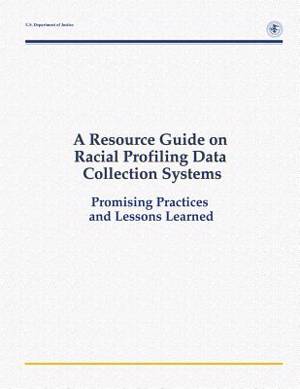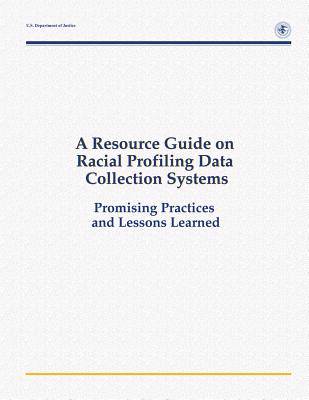
Door een staking bij bpost kan je online bestelling op dit moment iets langer onderweg zijn dan voorzien. Dringend iets nodig? Onze winkels ontvangen jou met open armen!
- Afhalen na 1 uur in een winkel met voorraad
- Gratis thuislevering in België vanaf € 30
- Ruim aanbod met 7 miljoen producten
Door een staking bij bpost kan je online bestelling op dit moment iets langer onderweg zijn dan voorzien. Dringend iets nodig? Onze winkels ontvangen jou met open armen!
- Afhalen na 1 uur in een winkel met voorraad
- Gratis thuislevering in België vanaf € 30
- Ruim aanbod met 7 miljoen producten
Zoeken
A Resource Guide on Racial Profiling Data Collection Systems
Promising Practices and Lessons Learned
Deborah Ramirez, Jack McDevitt, Amy Farrell
Paperback | Engels
€ 34,45
+ 68 punten
Omschrijving
On June 9-10, 1999, President Bill Clinton, Attorney General Janet Reno, civil rights leaders, police, and other government leaders participated in the Strengthening Police-Community Relationships conference in Washington, D.C. During the conference, President Clinton called racial profiling a "morally indefensible, deeply corrosive practice" and further stated that "racial profiling is in fact the opposite of good police work, where actions are based on hard facts, not stereotypes. It is wrong, it is destructive, and it must stop." As a result of increased national concern over racial profiling, the President directed federal agencies to begin gathering data on the race and ethnicity of persons stopped for future analysis. At a later session of the same conference, participants discussed the design and implementation of racial profiling data collection systems. That discussion featured presentations by state and local jurisdictions where efforts were already under way to collect data on the race, ethnicity, and gender of the individuals police stop. This guide is an outgrowth of that breakout session. As its title suggests, the guide is designed to provide law enforcement, state and local elected officials, civil rights leaders, community organizations, and other local stakeholders with strategies and practices for gathering and analyzing data about police stops. By providing information about the nature, characteristics, and demographics of police enforcement patterns, these data collection efforts have the potential for shifting the rhetoric surrounding racial profiling from accusations, anecdotal stories, and stereotypes to a more rational discussion about the appropriate allocation of police resources. Well-planned and comprehensive data collection efforts can serve as a catalyst for nurturing and shaping this type of community and police discussion. This guide is a blueprint that police and communities can use to develop data collection systems. It offers practical information about implementing these systems and analyzing the data. The guide is not intended to serve as a comprehensive and thorough inventory of all existing data collection systems. It focuses on providing detailed descriptions of data collection efforts in a few selected sites: San Jose, California, which has designed a simple letter-code system allowing information to be collected verbally (via radio) or by computer; San Diego, California, which utilizes an online data collection system; North Carolina, the first state to collect data on traffic stops pursuant to state legislation; Great Britain, which uses a paper based system to collect information on both traffic and pedestrian stops and searches; and New Jersey, which is collecting information on traffic stops pursuant to a consent decree with the U.S. Department of Justice (DOJ). These sites were first identified by DOJ in preparation for the conference and represent various population sizes and geographic locations. Site visits were later made to obtain further information about each site's data collection process. Since the conference, there has been a flurry of activity in this area and hundreds of jurisdictions have begun to initiate data collection efforts. This resource guide is organized into four main sections: Chapter 2: An introduction to the nature of the problem of racial profiling; Chapter 3: A general description of data collection and its limitations; Chapter 4: Study-site descriptions and analysis; Chapter 5: Recommendations and future goals. The "selected site" approach of this resource guide is intended to encourage and guide police and communities as they begin to take action to evaluate allegations of racial profiling and to help police and communities learn from one another's experiences and successes.
Specificaties
Betrokkenen
- Auteur(s):
- Uitgeverij:
Inhoud
- Aantal bladzijden:
- 78
- Taal:
- Engels
Eigenschappen
- Productcode (EAN):
- 9781479390595
- Verschijningsdatum:
- 25/09/2012
- Uitvoering:
- Paperback
- Formaat:
- Trade paperback (VS)
- Afmetingen:
- 216 mm x 280 mm
- Gewicht:
- 204 g

Alleen bij Standaard Boekhandel
+ 68 punten op je klantenkaart van Standaard Boekhandel
Beoordelingen
We publiceren alleen reviews die voldoen aan de voorwaarden voor reviews. Bekijk onze voorwaarden voor reviews.











